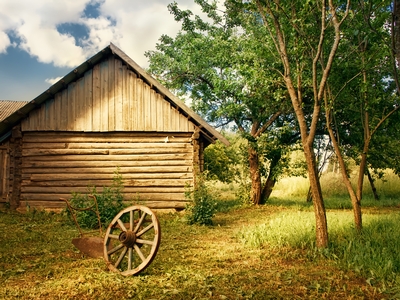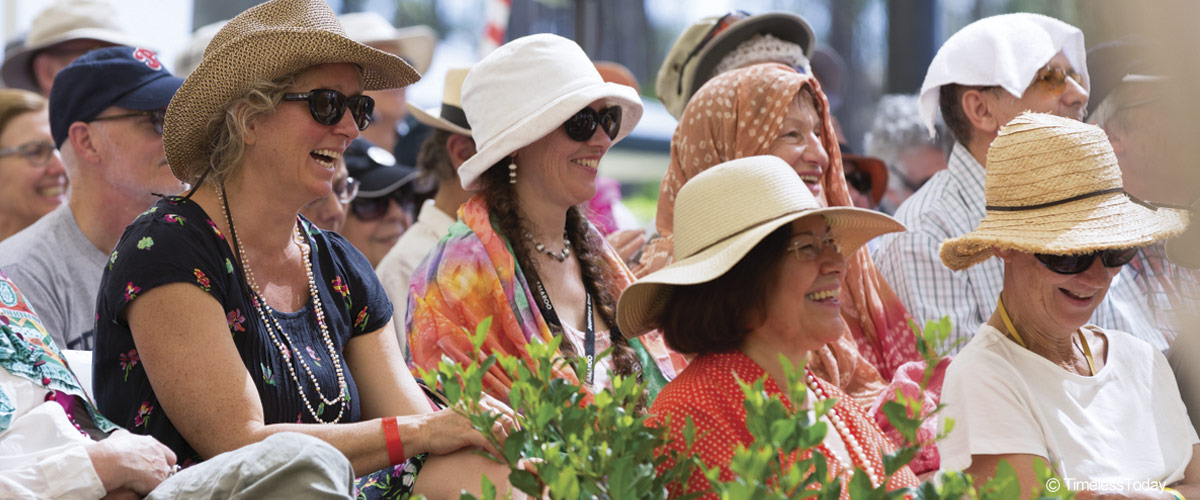The Glass of Water
I first heard the following story many years ago from Prem Rawat. I loved it then and I love it now, as it brings me back to a simple place of appreciation for life
What follows is my retelling of this tale. If I have messed it up in any way, please forgive me. It won't be the first time. If you enjoy it and would like to know more about my teacher and his message, click here or here or here. If you don't feel like clicking, no problem -- just savor whatever this story evokes in you.
ONCE UPON A TIME there was a young disciple of a great Master who found himself wrestling with a very difficult question -- one that would not go away no matter how much he contemplated it. Though he had asked all the senior monks in the monastery that had been his home for the past 20 years, no one had an answer that rang true to him. And so, one fine Spring day, gathering up all of his courage, he decided to approach the Master himself.

"Oh Illustrious One," the monk began, "for years I have been listening to your discourses. Time and again, you have referred to something called 'maya' -- the great illusion we are supposedly all bound by, but still I do not understand. Please, sir, can you explain to me what is this maya of which you speak?"
"Oh, my son," the Master replied, "yours is an excellent question. Most penetrating. And timely, too. Yes, I will be happy to provide an answer. But before I do, I have one request. Please bring me a glass of water. I am so very thirsty."
The young monk smiled, nodded his head and, with a simple bow, exited the room to begin his sacred mission.
His first instinct was an obvious one -- to walk to the well in the center of the monastery courtyard and draw the water. Upon reflection, however, he soon realized there was another, better source of water, just a little further up the road from the legendary well of a neighboring village.
"If I am going to get water for my Master," the young monk reasoned, "it has got to be the best."
And so, with a one-pointedness of focus he had never felt as deeply before, he was on his way.

The neighboring village, known not only for the purity of its water, but also for its breathtaking views, was not far away at all, but the road to it, washed out by a recent storm, was difficult to traverse and so the journey took just a little bit longer than expected. Fortunately, when the monk arrived, just a few minutes before sundown, there were only three people on line at the well and soon he would be on his way.
Thankful for his good fortune, he closed his eyes and turned his attention within, hearing only the sound of his breath -- one after the other -- and then, from who knows where, the sound of feint sobbing.
Surprised, he opened his eyes and noticed that the young woman standing in line before him was crying.
"Dear lady," the monk offered, leaning closer, "what seems to be the problem?"
"It is my father," she replied. "He is so very ill and nothing I do seems to help. I am besides myself with grief."
The monk nodded. "Yes, I understand. The body ages and declines. It is always sad to see our loved ones suffering, especially those who have brought us into the world."
For a moment, the two of them just stood there in silence, both at a loss for what to say. Then the woman spoke.
"Kind sir," she began, "I see, by your robes, that you are a monk. Is it true, as I've heard, that those of your order are masters of the healing arts?"
"Yes, it is true," dear woman. "From a very early age, we are taught many things -- how to chant, how to pray, how to meditate, read the stars, and heal with herbs and balms -- both of which I carry wherever I go."
The eyes of the young woman opened wider as she stepped forward and touched the monk lightly on the arm. "If it is agreeable to you, kind sir, would you, after drawing your water, accompany me ever so briefly to my father's house? Perhaps your healing touch is what he needs to stay alive."
Having been taught, for years, the power of service and compassion, the young monk's path was clear. "Of course!" he replied. "How could I refuse such a heartfelt request? Please, dear lady, lead the way."

It was only a short walk to her father's house, a small, well-kept cottage on the outskirts of town. One look at the old man was all it took for the monk to see the seriousness of the situation. Clearly, the man was at death's door and, unless the monk began immediately tending to his needs, it was obvious to him that the young woman would be fatherless by morning.
And so, all night, the monk sat by the old man's bedside, administering herbs and teas and balms, rubbing his feet, chanting sacred mantras and, all the while, abiding in a state of deep meditation.
At daybreak, when the young woman woke, she was amazed to see her father smiling, talking with the monk, the color of life having returned to his face. Bowing deeply, she embraced her father, stroked his hair, and kissed him lightly on the cheek.
"Praise God!" she cried. "And praise you, oh holy monk!"
"Thank you, dear woman. I appreciate your kind words, but it is not me that heals. It is the power of life and your father's will to live. But please know this: Your father is not yet healed. Last night was just a beginning. By my calculations, he will need at least three more days of care before he is back on his feet."
Three days. That was the monk's prediction. Not a long time to return from death's door. But on the fourth day, much to the monk's surprise, the father took a turn for the worse and died.
The old man's daughter, of course, was filled with grief. But grief was only part of what consumed her. She was also filled with fear. You see, with her father gone, there would be no one to run his shop of fine textiles in the center of town -- and with no one to run his shop, there would be no money to buy food and firewood, and with no food and firewood, the young woman would not only starve to death, but freeze, with winter fast approaching.
"Oh monk sent to us from God," she exclaimed on the fourth day after her father's passing, "I know what I am about to say is a lot to ask, but would you be willing to mind my father's shop for the next few days so I can get my house in order? The task is really quite a simple one. All you need to do is greet the people who enter the shop, help them find what they want, and sell it to them at a mutually agreeable price. In the meantime, I will fix you a bed in the barn so you will have a comfortable place to rest and meditate upon your return each night."
"I accept your kind invitation, dear woman. Remember, I have been trained to serve ever since I was a small boy. It's off to work I go. May God be with you on this glorious day."
One day turned to two. Two turned to four. And four turned to eight. Not only did the business grow with the young monk's loving care, so did his feelings for the woman. In time, his appreciation turned to fondness, his fondness turned to joy, and his joy turned to love. A year later they married and a few years after that they found themselves the proud parents of two beautiful children -- a boy and a girl -- both of whom the town elders claimed to be incarnations of great spiritual beings.
The young monk, now merchant and father, could not remember a time in his life when he had ever been as happy or as blessed.
Five years passed. Then another ten. In the 16th year of his adventure into love, 80 miles from his home on yet another buying mission in the extraordinary southern region, a sudden summer storm came upon the land. Not just any storm, but a storm whose ferociousness had never been seen before. It rained for days and days and days.
At first, the merchant simply buttoned up his coat, opened an umbrella, and trudged on, committed as he was to bringing home the finest of the region's textiles to his ever-growing store, especially since he had already taken advance orders from some of the town's most influential citizens. But no matter how steadfast he continued to be, the river continued to rise. And as it did, the keen-eyed merchant noticed three large bags of rice floating by him, bags marked with the insignia of his well-respected enterprise.
"This is not good," he said to himself. "Not good at all. It seems as if one of my silos must have been breached by the river. It's time to turn for home."
The rain kept coming. The river kept rising. And as it did, he noticed it carried more than bags of rice downstream. It also carried cows, three of which he recognized as his own.
"Not good, not good at all," he exclaimed again, digging his heels deeper into the side of his trusty steed and quickening his pace once again.
And then, yet another mile closer to home, he saw a sight he couldn't have imagined in a thousand years. There in the river, face up and unmoving, floated his young daughter and son.
"Oh my God," he wailed. "How can this be? My two precious children, gone. GONE!"
The man had never felt this kind of grief before, never such loss -- the only motivation he needed to gallop as fast as he could and return to the love of his life, the one who would be waiting for him, arms open, at home -- his sweet and precious wife.
Yes, he saw her, but far sooner than expected. There, not more than a few yards from where he now stood, he saw her, too, floating down the river, face up, unmoving, body bloated from a watery death.
Devastated beyond belief, he did what any man in his situation would do and threw himself headlong into the raging river. Simply put, he saw no reason to live anymore. Nor did he see, upon throwing himself into the water, a large piece of timber floating by. The impact of his head hitting this unseen piece of wood was strong enough to knock him out, the large piece of timber now a kind of makeshift raft carrying him downstream.
How long he floated no one knows for sure. Nor does anyone know where that miraculous piece of wood came to rest on the far river bank. But come to rest it did. Was he dead or alive? He could not tell. Shivering and stunned, all he could see when he opened his eyes was wet sand everywhere and what appeared to be a pair of feet. Rubbing his eyes, he continued staring at the feet now strangely familiar to him. Raising his head ever so slightly, he saw ankles, then the hem of a robe, and then, looking up all the way, the radiant face of a man looking down at him and smiling.
"Do you have my glass of water?" the Master said. "My son, many years ago you asked me to help you understand the meaning of maya. This... has been just one second of it. Welcome home."
A call for silver lining stories
Aussie interfaith wisdom circles
The sanctuary within
Posted by Mitch Ditkoff at 08:36 AM | Comments (3)
March 24, 2024Michelangelo's Reply

When asked how he created his iconic statue, DAVID, Michelangelo, as the story goes, said the following:
"I simply took away everything that wasn't."
The statue, you see, was ALWAYS in the stone. All it took was the sure hand of a master sculptor to remove whatever was not the masterpiece. Simple? Yes. But not necessarily easy.
In my brief time here on planet Earth, I have never met anyone quite as masterful as Prem Rawat in the fine art of removing the unnecessary. Listening to him speak his truth in ways that are utterly enchanting, the inconsequential falls away and what remains is the Masterpiece -- who we truly are behind the stone surface of our lives.
And as if THAT wasn't enough, he provides a simple way for people to stay connected to this experience wherever they happen to be at the time.
PHOTO: TimelessToday
PremRawat.com
Posted by Mitch Ditkoff at 04:53 PM | Comments (0)
March 16, 2024"What Ever Happens, Don't Stop Being Thankful for Being Here"









Posted by Mitch Ditkoff at 11:37 PM | Comments (0)

